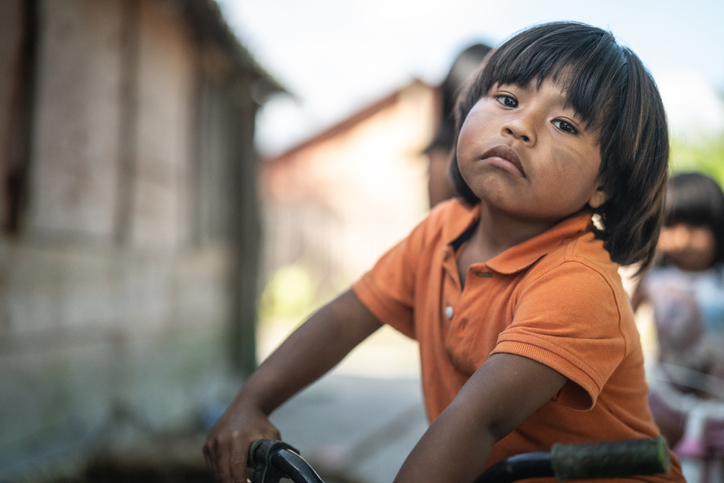It hasn’t been a very good year, has it? No matter what one believes politically, there is no Catholic who can feel good about children separated from their parents, put into cages, dying of neglect—or worse. I live in a country that allows this to happen. I am a citizen of a country that considers this an acceptable solution to a problem.
It’s not a comfortable thought.
I want my country to be more compassionate. I want my world to be more compassionate. So I turn to prayer. I ask God why; I ask him where he is when these terrible things are happening. Where is he when families are torn apart, when children are crying in the night?
And I hear his answer. He is here. He is in the camps at the border. He is with them, every day, every moment. He meets them in their pain and suffering. Where is he? He is sitting with the immigrants in their cages. He is holding the solitary frightened toddler as she cries. He closes the eyes of the young boy who just died.
But, I say to him, it’s not fair! How can you allow this to happen?
And he points me to today’s Gospel, difficult to read at the best of times, excruciating to read here and now in the Year of Our Lord 2019. If the birth of the Christ-Child in Bethlehem that we just celebrated could be considered the roses, then today’s reading surely points to the thorns surrounding them.
A voice was heard in Ramah, sobbing and loud lamentation; Rachel weeping for her children, and she would not be consoled, since they were no more.
The two themes of today’s Gospel reading have woven together this year in a most terrible way. First, we have a young family coming to the horrifying realization that they won’t be going home with their newborn, after all. That they cannot go home. That home is unsafe. That home means death.
They must leave the only place they’ve ever known, with nothing but the clothes they wear and the baby in their arms, and walk. For days stretching into weeks, they walk until they can enter another country, another culture, one they did not choose but have to embrace… and, somehow, survive there. It’s probable—in view of human nature as we see it around us—that Joseph and Mary, these refugees from Judea, were despised by the citizens of that new country. Viewed as Other. Viewed as Not Quite As Good As Us. Viewed as Them.
The Holy Family didn’t choose to be migrants, any more than many of the people at our borders want to be there. They are escaping—violence, death, starvation. They are there for the same reason the Holy Family was in Egypt: because it was the only option they had.
And then comes the massacre. The three wise men alert Herod—aging, feeling his power slipping from him, paranoid from the palace intrigue raging around him—to the birth of a new king in Bethlehem. Bethlehem at the time doesn’t actually amount to much; it’s a village of about 1,500 residents. Some interesting studies have shown there were probably no more than two dozen babies two years old and under—half of them female.
That’s still twelve to fifteen children murdered. Not enough to register in the mind of Josephus, our primary external source of the time; but enough. Enough for their parents. Enough for their communities. Every child is sacred. Every life is meaningful.
And it’s a number that’s getting dangerously close to the deaths suffered by children in the custody of the U.S. Border Patrol.
We celebrate Stephen as the first Christian martyr, but I wonder if we ought not think of those babies in Bethlehem as the first martyrs to Christianity. Innocent. Helpless. Just learning their first words, taking their first tentative steps. Dimples and gurgling and asking for just one more drink of water before they go to sleep. Gone.
And the other Baby, the newborn, living in poverty in Egypt, his family constantly on the move—we have sources for this, how they never stayed more than six months in one place, which can only point to the residents’ treatment of them—survived. God was with his Son, even as he is with all the children of migrants, the castaways, the Other.
It wasn’t a particularly auspicious beginning, was it? Rags and begging and just managing to get through the day. Surely God’s Son deserved better?
Surely everyone does.

Jeannette de Beauvoir is a writer and editor with the digital department of Pauline Books & Media, working on projects as disparate as newsletters, book clubs, ebooks, and retreats that support the apostolate of the Daughters of St. Paul at http://www.pauline.org.

